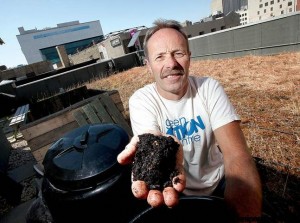 The Winnipeg Free Press reported Tuesday that over one quarter of a typical Winnipegger’s garbage is food waste. This is over 83 kg of compostables per person each year. We can do much better.
The Winnipeg Free Press reported Tuesday that over one quarter of a typical Winnipegger’s garbage is food waste. This is over 83 kg of compostables per person each year. We can do much better.
Not only is this a waste of valuable resources, but when compostables decompose in the landfill, they create dangerous greenhouse gases that lead to global warming.
We look forward to the City’s strategy to be released on how they will improve our waste collection system to get food scraps out of the garbage.
Related items:
Wasps or mice in your compost pile?
Green Myths – Composting is too much work and it stinks!
And check out our compost program page.



Karen, kitchen waste in a landfill decomposes anaerobically (without oxygen). This produces methane which is 25 times more powerful a greenhouse gas than CO2. Proper composting can reduce greenhouse gases by 96%. See our composting page for more details: https://greenactioncentre.ca/program/composting/
Thanks Lloyd, it does seem that this should read 83 kilograms of organic waste per person. I did a double check by comparing the residential waste report and the City of Winnipeg’s official population and found that the average Winnipegger produces 342 kilograms of garbage per year not 298 as cited in the article. Perhaps the consultant’s report did not include autobins. I will check with Darryl Drohomerski. In any case, its too much waste.
So, which is it? 83 kg per person or per household? Inaccuracies like this create scepticism, unfortunately.
Also, as kitchen waste creates greenhouse gases in the landfill, does this not also happen in composting facilities?
Thanks.
Hi Karen,
Large-scale composting facilities, like those set-up in windrow piles, should be regulary turned so that they are properly aerated, so there should be emitting no or minimal methane. If the pile is lacking oxygen that’s when there could be odours and methane being released. Some composting facilities are a digester-type which is anaerobic, so decomposes without oxygen, but these facilities capture the methane which could be used for energy, so methane is not released in the atmosphere. Digesters are expensive technologies so we don’t see them too often in North America.
Looking at the Free Press article, they use the term “average Winnipeger” so the 83kg of food waste in a year would be per person rather than per household. Multiply the 83 kgs by the average family of four and one can quickly see the potential diversion could be huge.